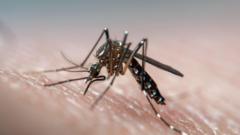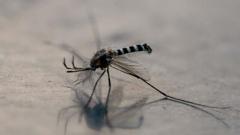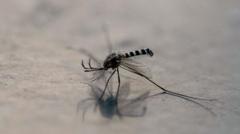In a groundbreaking study, scientists from the University of California have engineered male Aedes aegypti mosquitoes to be deaf, significantly decreasing their mating success. By targeting a specific genetic pathway essential for hearing, researchers hope to curb the spread of diseases like dengue, Zika, and yellow fever by controlling mosquito populations while considering their ecological role.
Genetic Innovations: Mutant Mosquitoes Take a Stand Against Dengue

Genetic Innovations: Mutant Mosquitoes Take a Stand Against Dengue
Researchers use a unique genetic approach to incapacitate male mosquitoes' ability to hear, hindering their mating success and aiming to reduce disease transmission.
In a striking development in the fight against mosquito-borne diseases like dengue, researchers have discovered an unconventional method to reduce insect populations by rendering male mosquitoes deaf. This innovative approach aims to disrupt mating behaviors that contribute to the spread of viruses such as dengue, yellow fever, and Zika by targeting the male mosquito's hearing ability.
The study, conducted by a team from the University of California, Irvine, focuses on Aedes aegypti mosquitoes, which are responsible for transmitting diseases affecting nearly 400 million people annually. These male mosquitoes typically depend on auditory cues from female wingbeats to pursue and mate, engaging in aerial mating that can last from mere seconds to almost a minute.
To thwart their mating success, the research team altered a genetic pathway associated with male mosquito hearing. By disrupting a protein known as trpVa—critical to sound detection—scientists were able to effectively mute the male mosquitoes. The audible signals that would typically attract them were rendered inaudible, resulting in zero physical contact with females even after prolonged exposure in a controlled environment.
The findings, published in the journal PNAS by researchers also affiliated with the University of California, Santa Barbara, highlight the complete failure of mutant males to engage in reproduction, marking the absolute effectiveness of this genetic intervention.
Dr. Joerg Albert, an expert in mosquito mating behavior from the University of Oldenburg in Germany, emphasized the potential of this strategy for mosquito control. He noted that while this study provides a pivotal molecular assessment of sound’s role in mosquito reproduction, it should be approached with care to understand the broader ecological impacts.
Dr. Albert suggested that further research is essential, stating, "Without the ability of males to hear - and acoustically chase - female mosquitoes might become extinct." The ecological importance of mosquitoes, not only as vectors for disease but as essential components of the food chain and pollinators, underscores the necessity for responsible management strategies.
In tandem with this genetic approach, other avenues, such as releasing sterilized male mosquitoes in infected regions, are also being explored for their potential effectiveness in tackling mosquito-borne diseases. This rare fusion of genetic engineering and population control could signal a new era in disease management, paving the way for innovative responses to public health challenges posed by mosquitoes.










